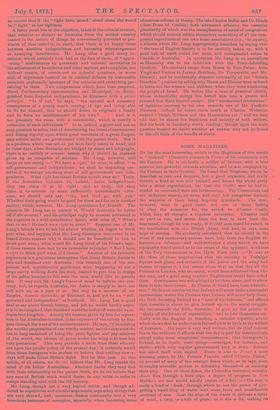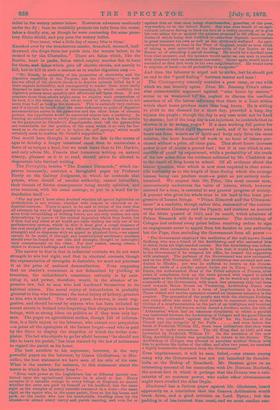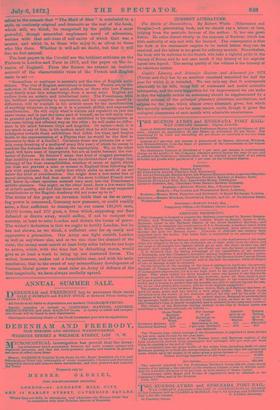SOME MAGAZINES.
By far the most interesting article in the Magazines of this month is " General " Cluseret's account in Fraser of his connection with the Fenians. He is evidently a soldier of fortune, with a bias more or less powerful towards socialism, and he was employed by the Fenians as their General. He found that Stephens, whom he describes as vain and despotic, but a good organiser, had really • thrown a kind of web over Ireland, and bound the whole party into a strict organisation, but that the 10,000 men be had in- tended to command were not forthcoming. The Committees had not sufficient money, no arms, and very few competent leaders, the majority of them being hopeless drunkards. The men, however, were in good order, not one of them failing to obey the summons for the attack an Chester Caktle, which they all thought a hopeless enterprise. -Cluseret took no part in this, and seems from the first to have been dis- heartened, though he was ready, if 10,000 men could be raised, to try conclusions with the British Army, and had, he says, some hope of success. He evidently calculated that hi should in the event of any momentary success have help from the English re- formers—a delusion—and authenticates a story which we have repeatedly heard stated as to the cause of the apparent weakness of the Tory Government in the Hyde Park riots :—" It was at the toilet in the watery mirror below. Rostratus advances cautiously under the fly ; then he stealthily projects his tube from the water, takes a deadly aim, as though he were contesting for some pisea- tory Elcho shield, and pop goes the watery bullet. 'Poor insect, what a little day of sunny bliss is thine.' Knocked over by the treacherous missile, drenched, stunned, half- drowned, she drops from her perch into the waters below, to be sucked in by the Chmtodon." There are fishes which, like the Bonito, hunt in packs, fishes which employ another fish to hunt for them, and fishes which give off electric shocks, not merely to kill, but to kill in such a manner as to render digestion easy :- " Mr. Conch, in speaking of the properties of electricity and the digestive capability of the Torpedo. has the following:—' One well- known effect of the electric shock is to deprive animals killed by it of their organic irritability, and consequently to render them more easily disposed to pass into a state of decomposition, in which condition the digestive powers more speedily and effectively act- upon them. If any creature more than others might seem to require such preparation of its food, it i3 the cramp ray, the whole canal of whose intestine is not more than half as loog as the stomach.' This is certainly very curious, and if it should be found that the same deficiency in point of digestive accommodation exists in the gymnotus and the other fishes of electric powers, the hypothesis would be converted almost into a certainty. In hunting up authorities to verify this curious fact, we find in the article on the gymnotus in Chambers's Encyclopedia, that 'all the gynanotidas are remarkable for the position of the anus, which is so very far for- ward as in the electrical eel to be before the gill openings,' which would certainly seem to confirm Mr. Couch's supposition.' One would have thought it easier for the fish in the course of ages to develop a longer intestinal canal than to accumulate a force of so unique a kind, but we must leave that to Dr. Darwin, and only advise Mr. Francis that humorous writing on natural history, pleasant as it is to read, should never be allowed to degenerate into farcical writing. The Fortnightly, besides "The Eustace Diamonds," which im- proves immensely, contains a thoughtful paper by Professor Beesly on the Galway Judgment, in which he contends that priests, when devoid of secular authority, cannot intimidate, their threats of future consequences being merely opinions, and even ventures, with his usual courage, to put in a word for in- timidation itself :— "For my part I have often doubted whether all special legislation on intimidation is not vicious, whether with respect to electoral or in- dustrial contests. There is much to be said in favour of the view that all attempts by way of legal penalty to prevent landowners or million- aires from intimidating or bribing voters, are not only useless, not only demoralising by reason of the cynical hypocrisy which they foster, but if they had any effect at all would pro tanto destroy the only use of the parliamentary system, which is, that it does give a rough measure of the real strength of parties (a very different thing from their numerical strength) and so dispenses with an appeal to physical force,—an appeal certain to be made, if through any constitutional machinery numbers should over be found on one side, and strength (bought or unbought) very conspicuously on the other. For that reason, among others, I object to woman's suffrage and vote by ballot !" The answer to that is that in industrial contests we do not want strength to win but right, and that in electoral contests, though the representation of strengths is desirable, we must not purchase it at the price of national demoralisation. Even supposing that an elector's conscience is not debauched by yielding to terrorism, the intimidator's conscience certainly is by exer- cising it, and power, therefore, would, in the absence of re- pressive law, fall to men who had hardened themselves to its habitual misuse. The moral injury of intimidation is probably greatest to him who threatens ; the moral injury of bribery, greatest to him who is bribed. The whole paper, however, is most sug- gestive, and should be read by anyone who has been irritated by recent events in Ireland into forgetting that clergymen are human beings, with as strong ideas on politics as if they were only lay- men. The paper on agricultural strikes, though full of informa- tion, is a little unjust to the labourer, who cannot save perquisites —a point all the apologists of the farmer forget —and who is paid by the State to display the stupidity of which the writer com- plains. The lad who objects to go far afield because "be should not like to leave his parish," has been trained by the law of settlement to regard the parish as his home. The best antidote to his argument, however, is the very powerful paper on the labourer, by Canon Girdlestone, in Mac- millan, the best statement we have seen of his side of his case. What is the answer, for instance, to this statement about the terror in which the labourer lives ?— "Even such power as the Legislature has at different periods con- ferred upon the agricultural labourer he is afraid to use. Every occupier of a rateable cottage in every village in England, no matter whether the rates are paid by himself or his landlord, has the same right as the occupier of every rateable tenement in a town—the same right as the squire who, in the same parish, lives at the big house and park, or the rector who has his comfortable dwelling close by the church—to attend every vestry and parish meeting, and vote for or against this or that man being churchwarden, guardian of the poor,. waywarden, or on the School Board. But who ever heard of an agri- cultural labourer daring to show his face at a vestry meeting, or to give his vote either for or against the persons proposed to fill offices, on the duties of which being well fulfilled or otherwise depends nevertheless in great measure his own as well as his children's welfare ? An agri- cultural labourer, at least in the West of England, would as noon think of taking a seat uninvited at the dinner-table of the Squire or the Rector as of attending a pariah meeting. He would be a marked man from that moment, and the farmers would unite as one man to punish with dismissal such an audacious innovator. Never again would auch a scoundrel as that find work in his own neighbourhood. He would have to migrate, at least,—in all probability to emigrate." And then the labourer is urged not to strike, lest he should put an end to the " good feeling " between master and man ! The Contemporary scarcely contains a poor essay, or one with which we can heartily agree. Even Mr. Bonamy Price's other- wise unanswerable argument against "nine hours by statute seems to us weakened by his neglect to discuss the cardinal assertion of all the labour reformers that there is a limit within which short hours produce more than long hours. He is willing to yield to the demand for a short day, provided a long day injures the people ; though the day in any case must not be fixed by statute; but if the long day is not injurious, he contends that to shorten it is to reduce, wages ? If a man working full power for eight hours can drive eight-thousand nails, and if he works nine hours can from weariness of spirit and body only drive the same number, the hour knocked off work is an hour of leisure pur- chased without a price, all clear gain. That short hours increase power is not of course a proved fact ; but it is one which is sus- ceptible of proof by experiment, while a probability of the truth of the law arises from the evidence collected by Mr. Chadwick as to the result of long hours in school. Of all evidence about the labour question, that which is now most required is clear scien- tific testimony as to the length of time during which the average human being can produce most—a point as yet entirely unde- termined. 11re suspect that Mr. Price, like most earnest men, unconsciously underrates the value of leisure, which, however misused for a time, is essential to any general progress of society. A peasant who gives his whole time to his land is the least pro- gressive of human beings. " Prince Bismarck and the Ultratuon- tanes" is a readable, though rather thin, statement of the contro- versy between Germany and the Papacy, and contains an account of the bitter quarrel of 1840, and its result, which admirers of Prince Bismarck will do well to remember. The Archbishop of Cologne had ordered every priest before receiving orders to sign an engagement never to appeal from his decision to any authority but the Pope, thus excluding the Government from all power :— "The Government employed the mediation of the well-known Count Stolberg, who was a friend of the Archbishop, and who entreated hint to desist from his high-handed course. But the Archbishop was inflex- ible, and when intimation was made to him that it would be agreeable to the Government if he resigned his office, he treated the suggestion with contempt. The patience of the Government was now exhausted, and on the 20th November, 1837, the Archbishop was arrested and con- ducted to Minden; nor was he suffered to return to his diocese. Another strife of a similar nature broke out in Posen. Archbishop Dunin, tho ecclesiastical Head of the Polish subjects of Prussia, after years of compliance, took up the same ground with regard to mixed marriages as the Archbishop of Cologne. As he would not yield to the commands of the Government, with much less ceremony than had been used towards Baron Droste zu Vischering, Archbishop Dunin was arrested, and condemned to a term of imprisonment in a fortress. These violent and unwise measures created an immense sensation in the country. The sympathy of the people was with the obstinate Prelates, and every effort was made by their friends to represent them as the victims of a cruel'persecution on the part of an irreligious and heretical Government. A well-known writer issued a brochure, under the title of Athanasius,' which had an immense circulation, in which a parallel WAS instituted between the Archbishop of Cologne and the great Church Father who contended 'against the World' for the freedom of the Church and the integrity of the Faith and even before the death of Frederick William III., there were indications that they were prepared to make concessions. The old King died in 1840, and was succeeded by Frederick William IV. On the accession of the new Ring, Archbishop Dunin was permitted to return to his diocese. The Archbishop of Cologne was allowed to associate another Bishop with him to perform the duties of the office, and after two years, he received a highly honourable dismission from the Government.' Even imprisonment, it will be seen, failed,—one reason among many why the Government has not yet launched its thunder- bolts at the Bishop of Ermeland. Mr. Strahan gives us au interesting account of his connection with Dr. Norman Macleodi,_ the newest fact in which is perhaps that the Doctor was a cari- caturist of no common power, who under other circumstances might have rivalled the elder Doyle. Blackwood has a furious paper against Mr. Gladstone, based apparently on a conviction that the Geneva Arbitration would break down, and a good criticism on Lord Byron ; but the padding is of less interest than usuab.and we must confine our- selves to the remark that " The Maid of Sker " is concluded in a style as curiously original and dramatic as the rest of the book, which will, we think, be recognised by the public as a moat powerful, though somewhat unpleasant novel of adventure, written with that.sub-tone of self-satire of which Galt was a master, and which is, to those who enjoy it, as olives to those who like them. Whether it will sell we doubt, but that it will live we feel assured. The best papers in the Cornhill are the brilliant criticism on the Pictures in London and Paris in 1872, and the paper on the in- vasion of England. From the former we extract an incisive account of the characteristic vices of the French and English taste in art Sensualism or nastiness is certainly not the vice of English exhi- bitions. The vice of English exhibitions is dulness. French art, as the refiection of French life and mind, suffers, as those who love France most dearly must fain acknowledge, from a moral taint. English art enffers from an artistic and intellectual taint. The Frenchman, with his brilliant susceptibility to impressions, and his complete moral in- difference, will be touched in his artistic sense by the manifestation of anything whatever, so long as it is a pointed, skilful, and expressive manifestation. He will enjoy what is vicious and repulsive on just the same terms, and in just the same part of himself, as he will enjoy what is graceful and dignified, if the one is exhibited to his imagination in the same telling and efficient way as the other ; he will make no differ- ence in his mind between Goya and Angelico. Or rather—well, is it too much to say of him, in his modern mind, that he will rather lean to indulgence towards those exhibitions that tickle his vices, and forgive faults in the representation of a Phyrne that he would be the first to denounce in that of a Cecilia? Certainly there are pictures (as a cer- tain camp-breaking of a mediaeval army this year) of which he seems to condone the dulness for the sake of the impropriety. We, on the other hand, will have none of impropriety, but are as lambs beneath the visi- tation of dulness. By dulness I mean that kind of clogged perception, that inability to see or render more than the obvious show of things, that lethargy of the finer susceptibilities, whether of sense or spirit, which yet does not prevent a man or woman in England from following the arts with applause. It is really that which sinks so much of an art below the level of consideration. One might draw a low-water line of moral elevation, and find that much of the most brilliant French work fell below it,—that oynicism entered very soon into the Frenchman's artistic pleasure. One might, on the other hand, draw a low-water line of artistic quality, and find that three out of four of the most respected contributions to the English Academy did not come up to it." The writer of the paper on invasion holds that as far as carry- ing power is concerned, Germany now possesses, or could readily seize, a fleet sufficient to transport to our coasts 126,000 men, 29,000 horses, and 270 guns, a force which, supposing our fleet defeated or drawn away, would suffice, if not to conquer the country, at least to seize London and dictate the terms of peace. The writer's deduction is that we ought to fortify London, but he has not shown, as we think, a sufficient case for so costly and oppressive a precaution. Our Army can fight outside London as well as anywhere else, and as we can close the channel of the river, the enemy must march at least forty miles before he can hope to arrive, which, with the time lost in debarking stores, would give us at least a week to bring up our scattered forces. The writer, however, makes out a formidable case, and with his main conclusion, that in the event of any extraordinary development of German Naval power we must raise an Army of defence of the first magnitude, we have always cordially agreed.




































 Previous page
Previous page